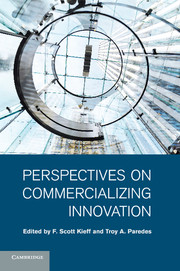Book contents
- Frontmatter
- Contents
- Contributors
- Dedication
- Acknowledgments
- Introduction
- Part I Perspectives on Theories of Intellectual Property
- Part II Perspectives on the Problems of Anticommons and Patent Thickets
- Part III Perspectives on Finance and Commercialization
- Part IV Perspectives on the University Innovation
- Part V Perspectives on International Considerations
- Index
Introduction
Published online by Cambridge University Press: 05 December 2011
- Frontmatter
- Contents
- Contributors
- Dedication
- Acknowledgments
- Introduction
- Part I Perspectives on Theories of Intellectual Property
- Part II Perspectives on the Problems of Anticommons and Patent Thickets
- Part III Perspectives on Finance and Commercialization
- Part IV Perspectives on the University Innovation
- Part V Perspectives on International Considerations
- Index
Summary
Intellectual property (IP) is a vital and growing part of the global economy, accounting for about half of the gross domestic product in countries such as the United States. Innovation, competition, economic growth, and jobs, all can be helped or hurt by different approaches to IP. But as is so often the case, the devil is in the details, and seemingly slight changes in the particular rules of the game can have remarkable impact. This book brings together diverse perspectives from the fields of law, economics, business, and political science to explore the ways varying approaches to this driving element of our economy and society can positively and negatively impact life at home and abroad.
A central debate within the field of IP relates to its very purpose. Some see IP rights as tools for granting private monopolies or other privileges directly to creative or inventive individuals. Some of those focusing on such a direct link begrudge IP as a form of harmful patronage to a select few politically effective beneficiaries, while others focusing on this direct link offer IP as helpful rewards for inventive or creative efforts. Others see IP as a more indirect set of tools for getting new inventions or creations put to use, and they embrace the right to exclude as a coordination device for getting diverse business parties to strike the necessary deals with each other so as to help achieve appropriate distribution and commercialization of intellectual as-sets. All seem to agree that IP rights work best when they help increase innovation and competition while getting ideas put to use as broadly and rapidly as possible. Not all agree on what this means for how the rules of the game should be structured or whether particular forms of creative and inventive works should be protected by legal IP systems at all. This book presents several perspectives on the many economic, legal, and scientific issues surrounding the commercialization of IP, with a focus on patents.
- Type
- Chapter
- Information
- Perspectives on Commercializing Innovation , pp. 1 - 6Publisher: Cambridge University PressPrint publication year: 2011



